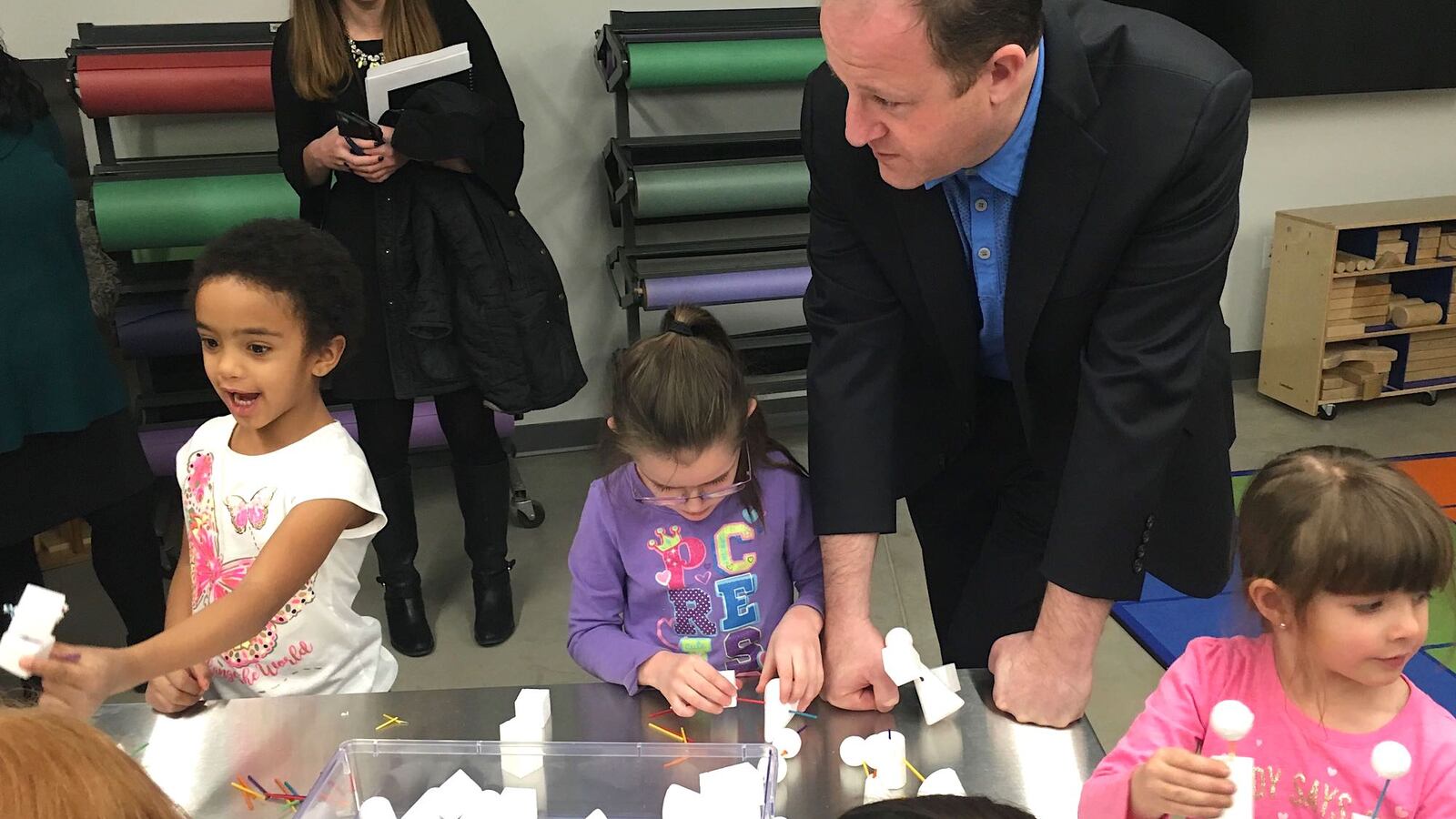When Colorado Gov. Jared Polis was running for office, he called for free preschool for all 4-year-olds whose families wanted it.
“We must provide free full-day preschool and kindergarten for our children and our economy to truly thrive,” he wrote in response to Chalkbeat’s candidate questionnaire.
But since taking office, that rhetoric has shifted. In his State of the State speech in early January, Polis pledged to achieve “universal access to quality preschool for 4-year-olds by the end of my first term.”
Asked recently what “universal access” means, he said simply: “It means 4-year-olds can go to preschool.”
But not necessarily for free. “It’s not like kindergarten,” he said. “It takes many forms.”
There are big challenges to paying for preschool in Colorado, a state that does not fully fund its K-12 education system and only this year started paying for full-day kindergarten, another campaign promise of Polis’. The state constitution limits how much revenue policymakers can keep each year, leading to stiff competition for dollars even in a strong economy.
But the shift in rhetoric away from “free preschool” is not unique to Colorado. W. Steven Barnett, senior co-director of the National Institute for Early Education Research at Rutgers University, said that talking about “universal access to preschool” has become commonplace in the early childhood sector nationwide.
However, “it’s not clear what people mean when they say this,” Barnett said. And it’s distinctly different from what we mean when we talk about “universal public education” in the K-12 system.
Planning for a major preschool expansion is challenging. The system is made up of a patchwork of public and private, for-profit and non-profit providers, with government subsidies from federal, state, and local sources helping low-income families afford spots.
Just 23% of Colorado 4-year-olds were enrolled in publicly funded preschool programs during the 2017-18 school year, according to the most recent preschool report published by the National Institute for Early Education Research.
Polis’ 2020-21 budget request calls for 6,000 new Colorado Preschool Program spots, which would be available to students considered to be “at risk,” usually because they live in poverty. The 2019 Kids Count survey estimates that 96,000 children under 6 have both parents working and are not in licensed child care, a number that includes many children from middle-class families. And 12% of young children have parents who have either quit a job or had to not take a job due to child care problems.
But even this $27 million budget request, which leaves half of low-income children without access to subsidized preschool, has met resistance from lawmakers of both parties who don’t think Colorado can afford it. Advocates, meanwhile, are working to place a nicotine tax on the 2020 ballot that, depending on which version is approved, could raise as much as $300 million a year for preschool.
Speaking generally, Barnett said when governors make promises about providing free preschool for all, they often don’t know what the cost will be, what the uptake will be, and how many kids might be funded through other sources like federal Head Start programs.
That uncertainty, he suspects, is one reason they punt by using shifting language.
“They‘ve promised it to everybody, and then they figure out a way to back off,” he said.
In Illinois, Gov. J.B. Pritzker also ran on “universal preschool,” with an eventual goal of free preschool, but now he’s promoting universal home visits and efforts to raise pay for early childhood teachers. Advocates are cheering this shift as more realistic because there aren’t enough early childhood teachers to teach every 3- and 4-year-old in the state and the government faces a chronic budget crunch that has slowed the pace of investments in early education.
In Colorado, some early childhood advocates see “universal access” as a broader agenda than just free preschool. Especially, outside of the Front Range, many communities lack licensed child care, and the efforts to address these problems will require more than the state providing funding for preschool seats.
“I love to hear that word,” Susan Steele, president and CEO of the Buell Foundation, which promotes early childhood development, said of the term “universal access.” “We have to think bigger than just dollars. There are many factors that play into access. Being cognizant of that while we push forward is so important.”
(The Buell Foundation is a supporter of Chalkbeat.)
Polis declined an interview request to discuss why he changed his rhetoric. Spokesman Conor Cahill said the governor still supports eventually offering free preschool for 4-year-olds.
“The governor is committed to doing everything he can to improve early childhood education including providing free, full-day kindergarten and expanding access to preschool,” Cahill said in an emailed statement. “The governor remains committed to this goal.”
Barnett, of Rutgers, said that to make progress, it’s important for leaders to have a clear vision. That’s one downside, in his view, to the vague language of “universal access.”
“If you create uncertainty, then you don’t move forward,” he said.

